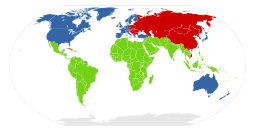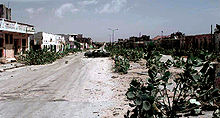- Third World
-
 The three worlds as they were separated during the Cold War era, each with its respective allies as of the period between 30 April 1975 (the fall of Saigon) and 23 August 1975 (the communist takeover in Laos). Colors do not represent current economic development.
The three worlds as they were separated during the Cold War era, each with its respective allies as of the period between 30 April 1975 (the fall of Saigon) and 23 August 1975 (the communist takeover in Laos). Colors do not represent current economic development. First World: the United States and its allies.Second World: the Soviet Union, China, and their allies.Third World: neutral and non-aligned countries.
First World: the United States and its allies.Second World: the Soviet Union, China, and their allies.Third World: neutral and non-aligned countries.The term Third World arose during the Cold War to define countries that remained non-aligned with either capitalism and NATO (which along with its allies represented the First World), or communism and the Soviet Union (which along with its allies represented the Second World). This definition provided a way of broadly categorizing the nations of the earth into three groups based on social, political, and economic divisions. Due to many of the 3rd and 2nd world countries being extremely poor, it became a stereotype to where people refer to poor countries as "third world countries". Third world countries included most of Africa, Latin America, and Asia.
The term is often used in a pejorative way.
Contents
Etymology
French demographer, anthropologist and historian Alfred Sauvy, in an article published in the French magazine L'Observateur, August 14, 1952, coined the term Third World, referring to countries that were unaligned with either the Communist Soviet bloc or the Capitalist NATO bloc during the Cold War. His usage was a reference to the Third Estate, the commoners of France who, before and during the French Revolution, opposed priests and nobles, who composed the First Estate and Second Estate, respectively. Sauvy wrote, "Like the third estate, the Third World is nothing, and wants to be something." He conveyed the concept of political non-alignment with either the capitalist or communist bloc.
Third World vs. Three Worlds
The "Three Worlds Theory" developed by Mao Zedong is different from the Western theory of the Three Worlds or Third World. For example, in the Western theory, China and India belong respectively to the second and third worlds, but in Mao's theory both China and India are part of the Third Non-Aligned World.
Third Worldism
Third Worldism has been defined as "the idea, popular among Third World autocrats and many American and French leftists in the late 60s and 70s, that – contrary to orthodox Marxism's view that the Western working class would deliver the world from the tyranny of capital that ... Third World elites were the privileged historical actor."[1]
History
A number of Third World countries were former colonies, and with the end of imperialism, many of these countries, especially the smaller ones, were faced with the challenges of nation- and institution-building on their own for the first time. Due to this common background, many of these nations were "developing" in economic terms for most of the 20th century, and many still are today. This term, when used today, generally denotes countries that have not "developed" to the same levels as OECD countries, and which are thus in the process of "developing". In the 1980s, economist Peter Bauer offered a competing definition for the term Third World. He claimed that the attachment of Third World status to a particular country was not based on any stable economic or political criteria, and was a mostly arbitrary process. The large diversity of countries that were considered to be part of the Third World, from Indonesia to Afghanistan, ranged widely from economically primitive to economically advanced and from politically non-aligned to Soviet- or Western-leaning.[2] An argument could also be made for how parts of the U.S. are more like the Third World.[3] The only characteristic that Bauer found common in all Third World countries was that their governments "demand and receive Western aid", the giving of which he strongly opposed. Thus, the aggregate term Third World was challenged as misleading even during the Cold War period.
Recently the term Majority World has started to be used since most people of the world live in poorer and less developed countries.[4]
See also
- Developing country
- First World
- Fourth World
- Non-Aligned Movement
- North-South divide
- Second World
- Third World Socialism
- Three Worlds Theory
Notes
- ^ Pithouse, Richard (2005). Report Back from the Third World Network Meeting Accra, 2005. Centre for Civil Society : 1-6.
- ^ For example, Dr. Sergey Zagraevsky considers that Russia is moving to Third World [1], [2]
- ^ "Third World America", MacLeans, September 14, 2010
- ^ "The 'North' and the 'South'"
Further reading
- Aijaz Ahmad, In Theory: Classes, Nations, Literatures. (1992)
- P. T. Bauer, Equality, the Third World, and Economic Delusion. (1981) ISBN 0-674-25986-6.
- J. Cole, Development and Underdevelopment. (1987)
- A. Escobar, Encountering Development. The Making and Unmaking of the Third World. (1995)
- E. Hermassi, The Third World Reassessed. (1980)
- A. R. Kasdan, The Third World: A New Focus for Development. (1973)
- P. W. Porter and E. S. Sheppard, A World of Difference: Society, Nature, and Development. (1998)
- H. A. Reitsma and J. M. Kleinpenning, The Third World in Perspective. (1985)
- Alan Whaites, States in Development, UK Department for International Development. London (2007), *
- A. Huffington, Third World America: How Our Politicians Are Abandoning the Middle Class and Betraying the American Dream. (2010)*
- P. J. Buchanan, State of Emergency: The Third World Invasion and Conquest of America. (2006)*
External links
South-South cooperation and Third Worldism The Third World Emerging markets · Emerging Markets Index · Newly industrialized country · Landlocked developing countries · ACP countries · Least Developed Countries · Heavily Indebted Poor Countries · Fourth WorldOrganizations G-77 · G-15 · G-20 · G-24 · G-33 · G-11 · G90 · ASEAN · SAARC · African Union · Melanesian Spearhead Group · United Nations Industrial Development Organization · UNDP · United Nations Conference on Trade and Development · Arab Monetary Fund · Asian Clearing Union · Asian Development Bank · Bank of the South · South Centre · Third World NetworkGeopolitics Decolonization · Neocolonialism · Third World debt · Cold War · IBSA · BASIC · BRIC · Next Eleven · Global digital divide · Flying Geese Paradigm · World Conference against Racism · Durban Review Conference · Fair tradeEconomic classification of countries Developed country · Developing country · Least developed country · High income economy · Newly industrialized country · Heavily Indebted Poor Countries Worlds Theory GDP Purchasing power parity (PPP)By country (future estimates · per capita [future estimates] · per hour worked, per person employed)GNI per capita Wages Other national accounts Human development Digital divide Categories:- Country classifications
- Political terms
- Politics by region
Wikimedia Foundation. 2010.

